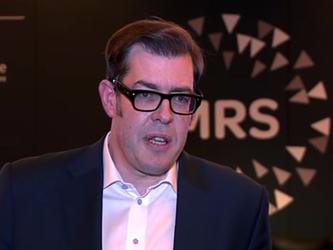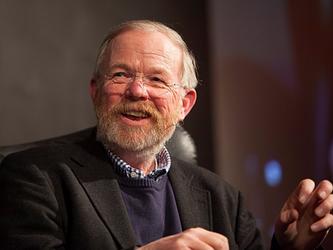Rabbi Neuberger: "make sure you look at all the data: you may change your argument"
Rabbi Neuberger, who has been Senior Rabbi at West London Synagogue since 2011 and whose own mother fled Nazi Germany, began by agreeing that there was a "compassion deficit" in relation to the European migration crisis. She said, commenting on the idea that the media was inflaming public opinion on the issue, that "a politician’s job is not just to listen, but to lead, and to change opinion through proper leadership".
"People have an unpleasant reaction to the idea that government can tell us what to do," Neuberger went on. "But we elected them to lead us, and democracy can't work without that."
She admitted, however, that, just as businesses do, politicians have a tendency to selectively use data to prove the point they want to make. "You may change your argument if you look at all the data," she said. "Look at it all and be a bit more honest with yourself."
To illustrate this point, Neuberger gave the powerful example of a review of the Liverpool Care Pathway – and end of life protocol – she chaired three years ago.
Going in to that review, which was prompted by negative media coverage of inappropriate compliance to the end of life care process it advocated, she had anticipated that the review would recommend improving communication of correct use of the pathway. What actually happened, Neuberger said, was that the review recommended scrapping it altogether.
"The way the guidance had been used became corrupted, and the brand was toxic."
Neuberger claimed that part of the reason for its failure was that it hadn't been properly evaluated. "I am a passionate believer in evaluation," she said.
She also blasted a lack of research into end of life care, branding it "not a fashionable area". The hospice-style palliative care system is very cancer-based, she said, when in actual fact only a quarter of people die from cancer in modern times.
"The way we die and the period over which we die is changing," she said. "This hasn't been picked up – there’s a big gap in the research."

We hope you enjoyed this article.
Research Live is published by MRS.
The Market Research Society (MRS) exists to promote and protect the research sector, showcasing how research delivers impact for businesses and government.
Members of MRS enjoy many benefits including tailoured policy guidance, discounts on training and conferences, and access to member-only content.
For example, there's an archive of winning case studies from over a decade of MRS Awards.
Find out more about the benefits of joining MRS here.














0 Comments